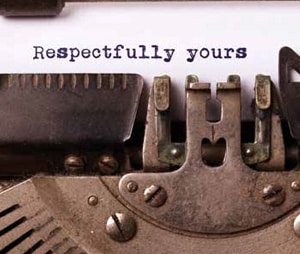
Norm Cowie, CCE
Director of Credit for Paramont-EO, Inc.
The email looked like many emails. And it was from a fellow worker I had no qualms with.
But before I even read the message, I was a little offended. The message itself was innocuous, and simply answered some questions I had posed to him earlier. He responded timely. He answered my questions.
So what irritated me?
It was the salutation which preceded the message. He didn’t write, “Hey Jerk” or
‘Dearest Sweetie’ or anything like that. Instead, he simply wrote, “Norm,” and proceeded to go into the message.
And that immediately impacted the mood in which I received the rest of the message.
Indeed, this form of salutation has become the, (cough) norm, and I get a lot of emails with this terse opening salvo. And I don’t like any of them.I come from a world where everyone used to write, “Dear” So-and-So. Okay, I get why we moved away from that. I mean, not everybody is dear to me, and I’d rather reserve that for family, or more, my mother because that was very common in her day. If I’m writing to an opposing attorney, he/she certainly isn’t dear to me, so I don’t want to make them think they’re special at all, because they already think they are.
But there are better ways to go, especially with casual communications like emails. If it’s a co-worker, try saying “Hi” or “Hey there.” For customers, “Good morning” or “Good afternoon.” “Happy Friday” works, but you probably should only use it on a Friday. And “Happy Monday” might meet with mixed results because it’s not the most joyous day of the week and starting with a lie might not be the best way to open a conversation.
But just saying “Norm” doesn’t work for me … at all. That’s how my mother used to address me when I was in trouble. Or nowadays when my wife, (who is not my mother, but she is a mother of our two hi-spirited daughters) would start a sentence with ‘Norm,’ generally what followed would go into something dumb I did that I would need to apologize for. So, when a sentence began with “Norm,” something good wasn’t coming, and my tail would automatically start moving under my butt.
This doesn’t mean that you should never use this salutation technique, but it should be reserved for when maybe a little harshness is appropriate. If you’re sending the fiftieth request for something to someone, sure, let it set the mood.
If you are in a back and forth with, say, an opposing attorney in a controversial episode, you can go a couple directions. You could write, “Mr. Smith” as a salutation if his name is Smith and he isn’t a she, and the terseness would be followed by the same attitude. Or throw him off, and old-time him with “Dear Mr. Smith,” which carries with it a hidden satire since you both know you aren’t dears. It’s always fun to follow that with a “Best” or “Best Regards” or “Yours truly”at the end, because you both know you don’t wish him well. But he can’t take offense at it, so you might actually be lowering the temperature in the building.
This isn’t to say that every time you deal with an opponent, you should try to stare meanly at him from your prose. You can make the letter super polite and simply kill him or her with facts. I used to give
a seminar where the entire session was based on actual letters between me and an attorney and I polited him into submission with evidence and logic, and at the end there was a copy of the certified check we used to resolve the case.
In fact, the happiest beginning salvos I receive in my email box are spam emails where someone is trying to sell me something I don’t need or want. But they have the friendliness down to a science. We could learn from them. I always think that before I send their email to my spam-folder and block them.
Another option, and one preferable to the “Norm” tactic is simply no salutation. Just go right into the message, which if the tone of the message is fine, wouldn’t tick anyone off.
So you don’t have to be a jerk, though there are times that being a jerk is
your best option, as long as you are professional and you tell him or her off with not actual words, but the hidden meaning cleverly disguised in your composition. I write satire (a dozen books now!), so for me it’s sort of easy.
Another thing you should use, especially in inter-office mails, are the smiling emojis. You can say something a little mean, but a happy yellow round ball behind it tells the recipient you don’t really mean harm.
Unless you do mean harm, for which there’s the frowny faced emojis.
(My award-winning book, MOONED is now available in hardcover. MOONED is a young adult book adults can read about a dog and cat turned into were humans by their werewolf master. Fun action. Check it out on Amazon.)
Recent Posts
- How Credit Managers Can Step into Executive Leadership November 13, 2024
- Economic Reconnaissance | Putting the FAB in Fabrinomics!! October 1, 2024
- Economic Reconnaissance | Sifting Through the Noise During “Silly Season” August 1, 2024
- A Big Win for Creditors of Small Business Debtors June 27, 2024
- Economic Reconnaissance | The Fable of Henny Penny June 4, 2024
- Economic Reconnaissance | Mixed Reviews for 2024’s Economy February 1, 2024










